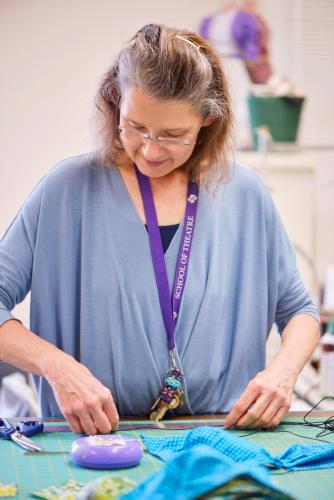NACOGDOCHES, Texas – It began a couple of weeks ago with an offer by Stephen F. Austin State University theatre faculty to sew surgical mask coverings for medical professionals on the front lines of battling the spread of COVID-19 in Nacogdoches County.
With the Texas Department of State Health Services reporting 25 positive COVID-19 cases and two deaths in this county alone as of April 8, Nacogdoches Memorial Hospital has requested that a grassroots community seamstresses effort coordinated by SFA theatre professor Angela Bacarisse expand its volunteer work to include the construction of protective gowns for the hospital’s health care providers.
Memorial Hospital Community Relations Director Kim Barton told Bacarisse this week that additional personal protective equipment orders have been placed, but hospital officials were uncertain when those orders could be filled amid a national public health crisis and medical supply shortage.
As a result, the band of local seamstresses have continued to assemble surgical mask coverings out of cotton fabric, while Bacarisse and SFA costume shop supervisor Barbara Blackwell are now focusing on constructing the more complex and labor intensive gowns.
“Barbara and I looked at each other and said, ‘OK, we have the facilities here at SFA, and we can make this happen,’” Bacarisse said. “But this isn’t just us. This is a group of SFA people – faculty, staff, spouses and a dean – who care about our community.”
Nacogdoches Memorial is used to collaborating with SFA on multiple levels, Barton said. The hospital utilizes student interns from a variety of departments, sponsors an assortment of cultural and sporting events and supports safety-related organizations like the Driving Jacks because they share Memorial’s mission of keeping Nacogdoches safe.
“We have always appreciated the value of the university as a partner and a resource, but the COVID-19 pandemic has really driven home the importance and the depth of that relationship,” she said.
Barton described the work that the SFA costume shop and others are doing as “incredibly personal to our staff,” adding the cloth masks are keeping the Memorial team safer in broad practical terms as they come and go throughout the hospital, “because the coronavirus could be anywhere.”
“We’re so grateful for that protection, but the isolation gowns are a completely different, extremely personal story,” she said. “They’ll be worn by staff members who know, without a doubt, that they’re dealing with a COVID patient. That barrier is an important layer of the equipment that will help keep them safe so they can continue to fight the fight, without worrying so much about their own health.
“We’re still early in the pandemic progression here in East Texas, and we’re incredibly blessed to have the advantage of the learning curve,” Barton added. “We’ve seen the news stories about healthcare workers wearing trash bags over their clothes as protection. That’s so incredibly dangerous if you don’t remove them correctly, because you can aerosolize the virus when you take off the trash bags. It’s a comfort beyond words to know that our community cares enough to work as hard as they are to make sure that won’t happen to our team.”
After seeing news articles a few weeks ago about the local effort, other seamstress volunteers have asked Bacarisse for the Centers for Disease Control and Prevention-compliant pattern for the masks. In addition to providing the homemade masks for hospital workers, the volunteers have provided cloth masks for local pharmacies, hospice organizations and law enforcement agencies that have asked for them.
“I have emailed instructions to hundreds of people who wanted to make their own,” she said, adding that anyone interested in volunteering to help with the protective gear construction effort may contact her at abacarisse@sfasu.edu.
Barton said the life-saving efforts underway communitywide right now are “beyond measure.”
“There’s just no way to quantify the value of the cooperation,” she said. “It’s not just that we’re working together on the community call center and the COVID-19 screening tent, which is vital to the health of our region. It’s that so many departments are reaching out to help us, from all of the SFA nursing professors and students to the SFA police department to the theatre, art and physics departments. The SFA community is using their time, their talents and sharing their resources to support the medical community, and whenever they meet a need, they ask what they can do next. It’s incredible and so very humbling.”
 Axe ’Em, Jacks!
Axe ’Em, Jacks!
